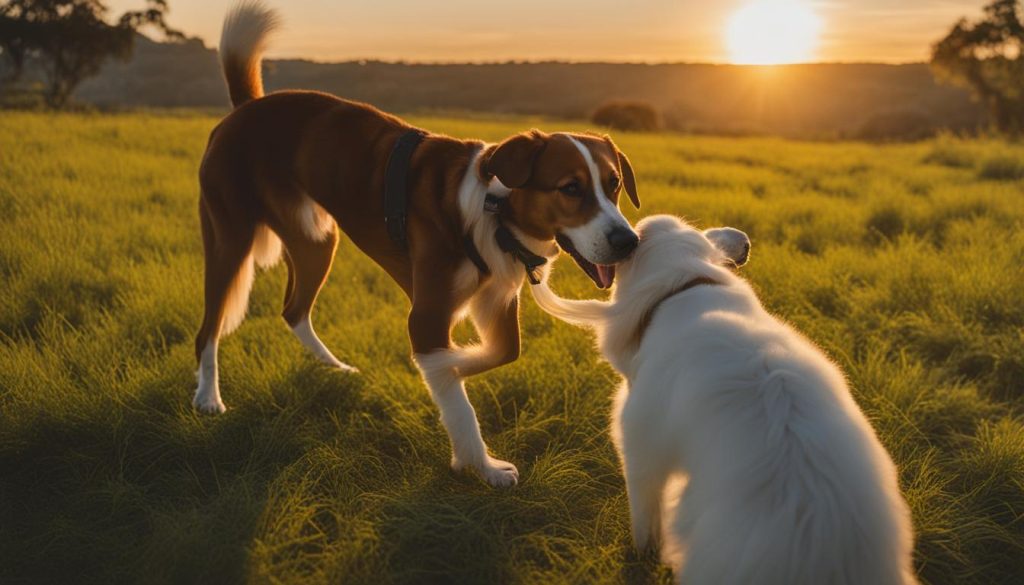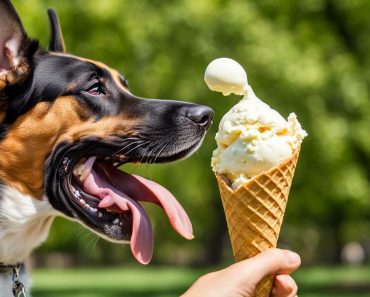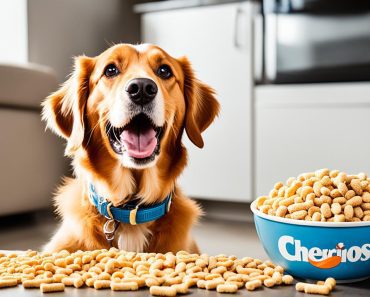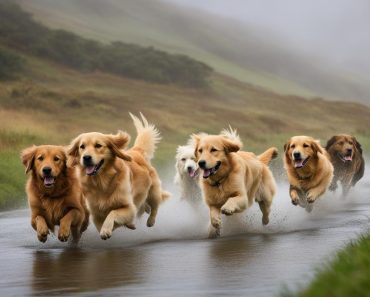As pet owners, we always want the best for our furry friends, ensuring their comfort and well-being. One common issue that dogs can face is impacted anal glands. When the anal glands become impacted, it can cause discomfort and even lead to more serious health problems. In this article, I will explore how to naturally ease impacted anal glands in dogs, providing them with relief and preventing further complications.
Key Takeaways:
- Impacted anal glands in dogs can cause discomfort and health issues.
- Factors that contribute to anal gland impactions include small, soft, or watery stools, lack of exercise, allergies, and compact anatomy in smaller breeds.
- Promoting firm, bulky stools through dietary supplements and enhancements, fiber-rich ingredients, fresh foods, adequate water intake, and regular exercise can help prevent and relieve anal gland discomfort.
- Seek veterinary assistance if a dog has anal gland impaction to avoid infection or abscess.
- Natural remedies such as dietary fiber supplements, fresh foods, adequate water intake, and regular exercise can help relieve anal gland distress.
Understanding Dog Anal Glands
Dogs have anal glands, located on both sides of the anal cavity at the 4 and 8 o’clock positions. These glands contain a liquid that serves as a way for dogs to identify themselves to other animals and mark their territory. Normally, these glands should empty with every bowel movement.
However, some dogs may struggle to naturally express their anal glands, leading to impaction. This can cause discomfort and various symptoms such as scooting, licking, or biting the area, as well as difficulty sitting or standing.
It’s important to note that expressing the anal glands manually should only be done by a trained professional and as a last resort, as it can cause more harm than good. Seeking veterinary assistance is crucial if a dog has anal gland impaction to avoid infection or abscess.
To prevent complications and ensure the well-being of your dog, it’s essential to understand the functioning of their anal glands and address any issues promptly with the help of a veterinarian.
Natural Remedies for Relieving Impacted Anal Glands
When it comes to treating impacted anal glands in dogs, there are natural remedies that can help alleviate discomfort and promote proper anal gland expression. By incorporating these remedies into your dog’s routine, you can address symptoms of impacted anal glands and prevent complications such as anal gland infection or abscess in canines.

Dietary Fiber Supplements
Dietary fiber supplements play a crucial role in promoting firm stools and supporting natural anal gland expression in dogs. Introducing fiber-rich ingredients into your dog’s diet can help regulate bowel movements and prevent anal gland impactions. Some beneficial fiber-rich ingredients include apple, flax seed, rice bran, and pumpkin.
Fresh Foods with Balanced Gut Microbiota
Providing your dog with fresh foods that promote a balanced gut microbiota can also contribute to healthy anal gland function. A diet rich in fiber, combined with fresh fruits and vegetables, can support digestion and prevent anal gland problems. However, it is important to consult with a veterinarian to ensure appropriate food handling and portion sizes.
Adequate Water Intake
Water intake is essential for flushing roughage and promoting healthy digestion in dogs. Ensuring your dog has access to clean and fresh water at all times can help prevent constipation and maintain proper anal gland function. Encourage your dog to drink water regularly to support overall digestive health.
Regular Exercise
Regular exercise is not only beneficial for your dog’s overall well-being but also plays a role in preventing anal gland issues. Exercise helps boost digestion and maintain a healthy weight, which can reduce the risk of anal gland impactions. Engage your dog in daily activities such as walks, playtime, or interactive games to promote healthy digestion.
Managing Diarrhea Symptoms
If your dog is experiencing diarrhea, it is crucial to manage the symptoms promptly to relieve anal gland distress. Utilizing fiber supplements and probiotics can help regulate bowel movements and restore the balance of gut bacteria. Consult with your veterinarian for suitable options and dosages to treat diarrhea safely and effectively.
By incorporating these natural remedies into your dog’s routine, you can help relieve impacted anal glands and promote anal gland health. However, it is essential to monitor your dog’s symptoms closely and consult with a veterinarian for proper diagnosis and treatment if symptoms persist or worsen.
Natural Remedies for Relieving Symptoms of Impacted Anal Glands
If your dog is already experiencing the discomfort of overfull anal glands, there are several natural remedies you can try to provide relief until you can schedule a veterinary appointment.
1. Anal Gland Supplements
Consider offering your dog anal gland supplements that contain digestive enzymes and probiotics. These supplements can support digestive comfort and promote healthy anal gland function.
2. Hygienic Wipes
Keeping the anal area clean is important for reducing skin irritation and neutralizing odors. Use hygienic wipes specifically designed for dogs to clean the area gently.
3. Topical Spray
A topical spray with anti-inflammatory ingredients, such as Lidocaine, can help target pain, itching, and discomfort associated with impacted anal glands. Follow the instructions on the product for proper application.
4. DIY Warm Compress
You can create a soothing warm compress using Calendula essential oil and warm water. Apply the compress to the affected area to provide relief and help reduce inflammation. Be sure to use a safe and appropriate dilution ratio for the essential oil.
Note: It is important to remember that manual expression of anal glands should only be done by a trained professional and relied upon in advanced cases of anal sac disease. Seeking veterinary assistance for proper diagnosis and treatment is crucial for your dog’s well-being.
Preventing Anal Gland Impactions in Dogs
Preventing anal gland impactions is crucial for dogs’ overall health and well-being. It is essential to take proactive measures to support the natural expression and proper functioning of dogs’ anal glands. Here are some key strategies to help prevent anal gland problems:
- Provide a high-fiber diet: Including natural ingredients and supplements in your dog’s diet can help promote firm stools. Fiber-rich foods like pumpkin, flaxseed, and rice bran can support regular anal gland expression.
- Manage exercise routines: Ensuring that your dog gets daily physical activity is vital for maintaining healthy anal gland function. Regular exercise helps stimulate the bowels and promotes regular bowel movements, reducing the risk of anal gland impactions.
- Maintain a healthy weight: Obesity can increase the risk of anal gland problems in dogs. Keeping your dog at a healthy weight through a balanced diet and regular exercise can help prevent compacted stool and reduce the likelihood of anal gland impactions.
- Treat allergies: Allergies, both food and environmental, can contribute to anal gland issues. If your dog has allergies, work with your veterinarian to identify and manage the triggers. By minimizing allergic reactions, you can reduce the risk of anal gland problems.
By implementing these preventive measures, you can significantly reduce the chances of your dog experiencing anal gland problems. However, it’s important to closely monitor your dog’s health and behavior. If you notice any symptoms of anal gland issues, such as scooting, licking, or signs of discomfort, consult with your veterinarian for a proper diagnosis and treatment plan.
Conclusion
Easing impacted anal glands in dogs naturally is crucial for their well-being and comfort. By implementing dietary measures, exercise, and proper hygiene, pet owners can help prevent and relieve the discomfort associated with anal gland issues. Providing a diet that promotes firm and bulky stools, incorporating fiber-rich ingredients and fresh foods, ensuring adequate water intake, and regular exercise can greatly contribute to anal gland health in dogs.
It is important to promptly address any symptoms of impacted anal glands in dogs and seek professional veterinary assistance for a proper diagnosis and treatment plan. Regular check-ups and consultations with a veterinarian are essential to ensure the overall health and wellness of dogs.
Remember, prevention is key. Maintaining a high-fiber diet, managing exercise routines, and addressing any allergies or underlying health conditions can help prevent anal sac impaction in canines. By taking proactive measures, pet owners can promote the well-being of their furry companions and minimize the risk of anal gland problems.
FAQ
What are the symptoms of impacted anal glands in dogs?
Symptoms of impacted anal glands in dogs may include scooting, licking or biting the anal area, and difficulty sitting or standing.
How can impacted anal glands in dogs be treated?
Impacted anal glands in dogs can be treated by promoting firm stools through dietary supplements and fiber-rich ingredients, as well as ensuring regular exercise. It is important to consult with a veterinarian for appropriate treatment options.
What can cause anal gland impactions in dogs?
Factors that can contribute to anal gland impactions in dogs include small, soft, or watery stools, lack of exercise, inflammation from allergies, and compact anatomy in smaller breeds.
Can I manually express my dog’s anal glands?
Manual expression of a dog’s anal glands should be done by a trained professional and only as a last resort, as it can cause more harm than good. It is important to seek veterinary assistance if a dog has anal gland impaction.
How can I provide comfort to my dog with impacted anal glands?
Providing anal gland supplements, keeping the area clean with hygienic wipes, using a topical spray with anti-inflammatory ingredients, and applying a DIY warm compress can provide temporary relief until a veterinary appointment.
How can I prevent anal gland impactions in my dog?
Preventing anal gland impactions in dogs can be achieved by promoting firm stools through dietary measures, providing a fiber-rich diet, maintaining regular exercise routines, and addressing any allergies that may contribute to anal gland issues.






